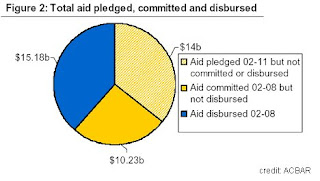Underwhelmed with aid
ACBAR is the Agency Coordinating Body for Afghan Relief, a sort of umbrella organisation to  coordinate aid in Afghanistan. The other day, they released a new report authored by Matt Waldman (a researcher with Oxfam - see here) entitled "Falling Short: Aid Effectiveness in Afghanistan" (available here in pdf). It's causing a bit of a stir for its claim that some 40% of all aid money spent returns to donor countries as profits and fees. However, the problems are far worse than that, not least of which is the fact that much of the pledged aid is never delivered (see graphic).
coordinate aid in Afghanistan. The other day, they released a new report authored by Matt Waldman (a researcher with Oxfam - see here) entitled "Falling Short: Aid Effectiveness in Afghanistan" (available here in pdf). It's causing a bit of a stir for its claim that some 40% of all aid money spent returns to donor countries as profits and fees. However, the problems are far worse than that, not least of which is the fact that much of the pledged aid is never delivered (see graphic).
Here's a Reuters article on the report:
Afghan peace hurt by failed aid pledges - agenciesTurning to the ACBAR report itself, coming in for particular comment is the Provincial Reconstruction Team, or PRT:
KABUL, March 25 (Reuters) - Peace in Afghanistan is being undermined by the failure of Western nations to deliver promised assistance, aid agencies said on Tuesday.
Afghanistan relies on international aid for 90 percent of its spending ...
The U.S. military alone now spends some $100 million a day fighting Taliban insurgents in Afghanistan, but spending on aid by all donors since 2001 amounts to only $7 million a day. ...
Afghanistan received just $57 per capita in aid in the two years after international intervention, compared with $679 a head in Bosnia and $233 in East Timor, it said.
The international community has pledged to spend some $25 billion on reconstruction and development in Afghanistan.
But, the report said, "just $15 billion in aid has so far been spent, of which it is estimated a staggering 40 percent has returned to donor countries in corporate profits and salaries".
While there are problems delivering development due to poor security, government corruption and the ability of the country to absorb aid, major donors have fallen far behind on their pledges, ACBAR said.
The United States, by far the biggest donor, has paid out only half of the $10 billion it committed in aid to Afghanistan for the period 2002-2008, the Asia Development Bank and India only a third of their pledged assistance for the same period.
Two-thirds of international assistance to Afghanistan bypasses the Afghan government, undermining the rebuilding of its state institutions. Donors also do not coordinate well among themselves and with the Afghan government, the report said.
Afghanistan called for funds to be channelled through government coffers. ... (link)
With greater funding and technical capabilities PRTs have often overshadowed and in some cases assumed the responsibilities of local government. Thus, they have slowed the emergence and development of state institutions at local level, which jeopardises the broader prospects for medium to long term statebuilding. It also hinders efforts to increase Afghan ownership of the development process. ... (link to pdf)A few weeks ago, we heard from the Guardian's Conor Foley, who is well-informed on the subject of aid. "Six years into the occupation, it is clear that the PRT strategy has failed," he wrote (see blog entry here).
Elsewhere, Foley has more on the subject:
Sleepwalking to disasterWith all these disastrous effects of the militarization of aid, it is not surprising that aid organisations are under fire:
By Conor Foley - February 26, 2008
... Aid is being poured into areas, not on the basis of where it is needed, or can do any good, but solely because of its supposed ability to buy the allegiance of local populations to stop them trying to kill western soldiers. If the strategy was working then we could at least discuss its merits, but it patently is not because the insurgency is spreading. Almost all of the areas which have received the largest assistance over the last few years are now increasingly coming under the Taliban's control.
Much of the aid is being delivered by military-led Provincial Reconstruction Teams (PRTs), which the head of one UN agency described to me as being "largely amateurs with plenty of money, but little sense of what needs to be done or how." ... (link)
Kabul’s development community returned from an important conference of donors in Tokyo this month, depressed that government ministers increasingly blame the international community for Afghanistan’s problems. ... (link)



No comments:
Post a Comment